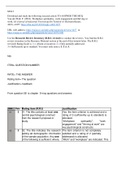MCQ 3
Download and study the following research article TO ANSWER THE MCQ
Van der Walt, F. (2018). Workplace spirituality, work engagement and thriving at
work. SA Journal of Industrial Psychology/SA Tydskrif vir Bedryfsielkunde,
44(0), a1457. https://doi.org/10.4102/sajip.v44i0.1457
URL web address: https://sajip.co.za/index.php/sajip/article/view/1457 or
https://sajip.co.za/index.php/sajip/article/view/1457/2196
Use the Research Review Inventory (R.R.I. revised) to conduct the reviews. You find the R.R.I.
review inventory in the Resource Material section at the end of this tutorial letter. The R.R.I.
(revised) Rating Scale is: 1 = Absent or incorrect; 2 = Only partially addressed;
3 = Sufficiently up to standard. You must only enter a 1, 2 or 3.
key
ITEM= QUESTION NUMBER
RATE= THE ANSWER
Rating item= The question
Justification= feedback
From question 58 is chapter 9 mcq questions and answers
Item Rate Rating item (R.R.I) Justification
01 3 01. The title contains at least one Yes, the item criterion is achieved and a
central psychological construct rating of 3 (sufficiently up to standard) is
from the research proposal or allocated.
study. “Workplace spirituality", "work
engagement" and "thriving at work" are
key psychological constructs.
02 2 02. The title indicates the research The item criterion is not completely
setting or demographic information satisfied and a rating of 2 (partially
of the sample population. Any one addressed) is allocated.
of the following is sufficient: where, "Work" and "workplace" are indicated. This
, who, when, under what is a generic description of the research
circumstances, or the phenomenon setting and is insufficient. The title should
that is being investigated. have included the work context: "small,
medium and macro enterprises (SMMEs)"
or the locality of: "the Free State province"
or "South Africa" for a complete
description.
03 1 03. The title points to, or refers to No, the item criterion is not addressed anda
the research method, design or rating of 1 (absent) is allocated.
paradigm. This may be signalled by The title does not provide any indication of
a keyword or phrase such as: “lived the research method, design, or paradigm
experiences”, “perceptions”, that was followed.
“attitudes”, “constructions”,
“discourses”, “quasi-experimental”,
“critical study”, “psychometric
properties”, “correlational study”,
“inferential study”, and so on.
04 3 04. The abstract indicates the The abstract or summary is provided in the
research interest, issue or text box at the beginning of the article. The
problem. item criterion is achieved and a rating of 3
(sufficiently up to standard) is allocated.
The research orientation is to investigate
how employees can sustain high
performance over the long term. The
research purpose was to establish whether
spiritual workplaces
will enhance employees’ work
engagement and thriving at work.
05 3 05. The abstract indicates the Yes, the item criterion is achieved and a
setting, demographic or rating of 3 (sufficiently up to standard) is
circumstances pertaining to the allocated.
research interest or question. Any The study was quantitative in nature, and
one of the following is sufficient: data were collected from
where, who, when, under what Setting: employees working at small,
circumstances, or the phenomenon medium and macro enterprises (SMMEs)
that is being investigated. in one geographical area in South Africa.
Phenomenon: workplace spirituality, work
engagement and thriving at work.
06 3 06. The abstract contains the Rate: 3
specific research question or The purpose of the study was to establish
research statement. whether spiritual workplaces will enhance
employees’ work engagement and thriving
at work.
07 1 07. The abstract indicates the key Rate: 1
theoretical perspective(s) that is The abstract does not mention theoretical
(are) used in the literature. perspective.




